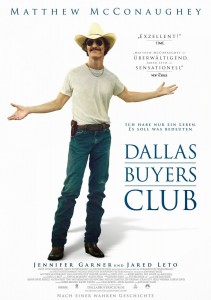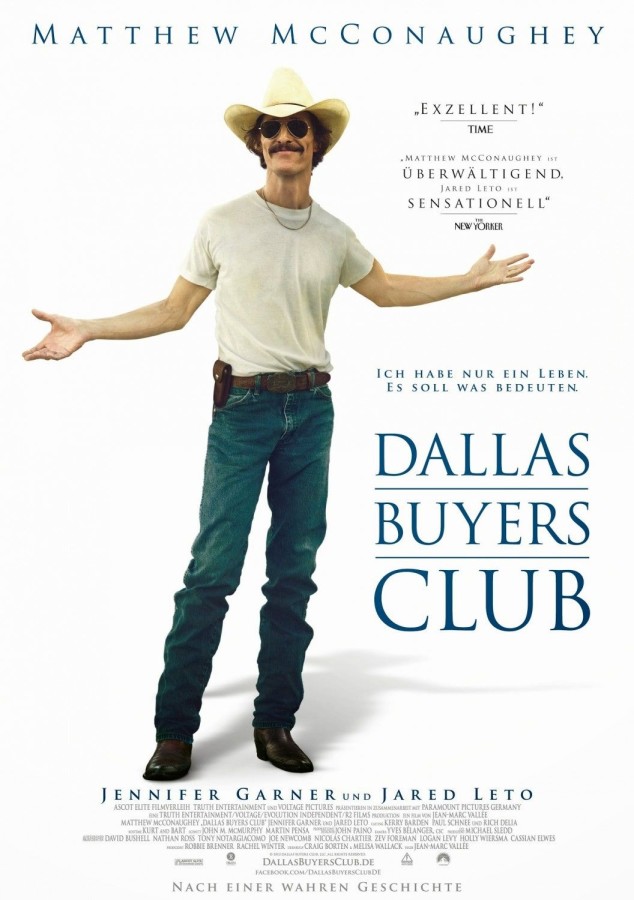by Steven Himes

“Dallas Buyers Club,” among its other achievements, explains why the liberal dream of single-payer health care will never work in the United States. The story of Ron Woodroof (Matthew McConaughey) defies belief: a part time electrician and rodeo gambling hustler contracts HIV, then reinvents himself as an international businessman who defies the FDA to sell AIDS treatments out of a sleazy hotel room. These drugs are far more effective than the FDA-approved ADZ, which was patented by pharmaceutical giant Burroughs Wellcome (later GlaxoSmithKline), who paid doctors to prescribe treatments. The FDA shut Woodruff down, of course, but not before he exposed the misdeeds of a government agency, bought-and-paid-for by corporate interests at the expense of suffering people.
Or so the story goes. There’s plenty of controversy about whether Woodroof’s “treatments” actually worked, and whether or not he underwent the dramatic moral transformation the movie depicts. I am unqualified to give an opinion on either issue, and I think they’re beside the point anyway. Movies excel at showing how things work, and what “Dallas Buyers Club” describes is how unregulated money corrupts institutions that are supposed to serve the public good.
This is important for us to understand when we think about healthcare in the United States. Many conservatives say that government regulation raises health insurance costs, which prices out the sick, old, and poor. The reality is that free market health care fails because it makes no business sense for insurance companies to insure the sick, old, and poor, no matter the regulation. Insurance companies make money by charging monthly premiums that 1) exceed the total amount they’ll pay out in claims, and 2) earn them interest when they invest the excess. Insuring the sick, old, and poor makes no business sense because the companies are virtually guaranteed to pay out more in claims than they’ll make in premiums and interest.
Many liberals insist the solution is that only government should pay for healthcare. One part of the theory is something like bulk-buying: When you go to Costco and buy a case of soda, the per-can cost is much lower than if you buy a single can at Quik Trip. Applied to healthcare, if we know that Americans are going to buy a whole bunch of Lipitor for our cholesterol, it makes more sense for the government to buy the drug in bulk and negotiate the best price.
The underlying assumption is that the government can be trusted to negotiate the best price from the company. In many European countries with single payer healthcare systems, that’s exactly how they do it–the National Health Service of the United Kingdom being the foremost example. You pay higher taxes, but you can go to the doctor (mostly) for free. People can (and many do) buy their own supplemental insurance to cover major expenses beyond basic care, but most everybody pays into and uses the government system. The NHS then bulk-buys medications to keep costs down, and since it is by far the largest purchaser, the NHA can virtually set the price. Thus, even the sick, poor, and old get covered for much less than they do in the United States.
But there’s one key difference between these countries and the United States: In Citizens United v. FEC, the United States Supreme Court declared unconstitutional almost every restriction on corporate money in elections. The result is that billions of dollars have poured into congressional and presidential elections, creating a fundraising arms race where politicians are constantly raising millions of dollars from corporate interests just to survive.
This is where “Dallas Buyers Club” explains how under-regulated capitalism corrupts health care. For doctors to administer a drug in the United States, it must be approved by the FDA. This process is very time consuming and expensive, and often requires the cooperation of doctors who are willing to perform tightly controlled experiments on their patients to determine the drug’s effectiveness. Thus, only large pharmaceutical companies can invest the millions necessary for drug developing, patenting, and gaining approval. In the 1980s, there were few restrictions on the “kickbacks” doctors received for their cooperation in gaining approval, creating a system where some doctors were, at best, incentivized to advocate for a drug’s approval, and at worst were paid off to push risky pharmaceuticals on the public.
So, when Ron Woodroof contracts HIV and develops full-on AIDS, he’s given 30 days to live. He goes into denial (“Ain’t nothin’ out there that can kill Ron Woodroof in 30 days”), but as it becomes more obvious that he’s sick, Woodroof spends days at the library educating himself on the disease. Woodroof calls AIDS a “gay disease,” but after spending some intense days researching at the public library, he realizes that he probably contracted the disease from using dirty drug needles. Woodroof eventually goes back to the hospital. The lead doctor, Dr. Sevard (Denis O’Hare), is conducting a clinical trial that requires him to disclose to patients that they may receive a placebo rather than the actual medicine, AZT. We see an ominous scene where Important Men In Suits pitch the drug to the doctors, and it’s made clear the physicians themselves will get paid off on the back end if AZT gets FDA approval. Sure enough, the doctor’s research ends up showing that AZT is effective.
Woodroof–who is such a hustler that his first scene involves him running from rodeo gamblers, then punching a cop to get arrested so he doesn’t have to pay them off–can’t stand the notion that he might not get the real drug. So he pays off a janitor to bring him pilfered AZT out back by the dumpster. When the source dries up, Woodroof gets intel that a doctor in Mexico is selling effective AIDS drugs, after he had his license revoked in the United States for prescribing unapproved treatments. Woodroof proposes to smuggle boxes of the drugs across the border to sell underground in Dallas. Soon, Woodroof disguises himself as a doctor and as a priest driving crates full of drugs to a shady hotel room. He sets up the Dallas Buyers Club: For $400 a month, you can get all the AIDS drugs you need.
Back at the hospital, Dr. Saks (Jennifer Garner) sees AZT “poisoning” her patients, and resigns when Sevard refues to report the results truthfully to the FDA. She goes in search of Rayon (Jared Leto), a transgender AIDS sufferer who befriended her and Woodroof in the hospital. Turns out, Woodroff has cut Rayon in on the racket because of Rayon’s access to dozens of new customers in the Dallas gay community. The Dallas Buyers Club becomes successful enough that Woodroof becomes an international businessman of sorts, flying to Japan–anywhere he can get the drugs the FDA won’t approve.
The human interest side of the film is Ron’s transformation from small time hustler into, literally, an international businessman who walks purposefully through airports in nice suits and a briefcase. This human transformation also develops the film’s central argument. When Dr. Sevard and the FDA discover that the Dallas Buyers Club (and others like it around the country) are cutting into the pharmaceutical companies’ business, the FDA raids the hotel but can only fine Woodroof. So, the FDA changes its regulations to make selling unapproved drugs illegal, creating a legalized monopoly for pharmaceutical companies with exclusive FDA approval. Now the Dallas Buyers Club has been criminalized, and the film ends with Woodroof pleading his case before a sympathetic judge who nonetheless denies him the right to use his drugs. The judge has no grounds to overturn the FDA’s regulations, leaving the FDA as virtually the sole arbiter of what drugs are legal–which can only be obtained by big pharmaceutical companies who have the resources to navigate the expensive and time consuming process of FDA approval.
In other words, these big pharmaceutical companies are every bit the hustlers as Ron Woodroof, but they function more like a mafia: buying off the authorities, intimidating small timers encroaching on their turf, and ultimately crushing opposition by sheer force.
This is why single payer government health care can’t work in the United States. In economics, “regulatory capture” refers to the phenomenon that government agencies, created to serve the public good, often end up being “captured” by the industries they’re supposed to regulate. Most often, this happens in two ways: 1) the only people with the expertise to regulate the industry have such deep ties to the industry that they’re biased towards protecting the industry’s interests, or 2) the stakes are so high for industries that they will use any means necessary, including bribery, to gain the favor of regulators.
By virtually deregulating corporate donations to political interests, the Supreme Court has created a corridor for health care industries to capture health care regulators. How can we have a European style single payer system (of which there are many variations) if the very industries that profit from system can put extraordinary pressure on the regulators? Especially when regulators, whose agencies are headed by political appointees that, as the Senate Republicans have proven since 2008, will withhold consent for any variety of self-interested reasons?
Captured regulators will do exactly what they did to Ron Woodroof: run lower cost operators out of business, give legalized monopolies to companies who pay them off, and then hand the bill to taxpayers.
This is not an argument for the morality of Ron Woodroof’s car-trunk and hotel-room medical practice. Of course we don’t want a system where guys like Ron are importing questionable drugs from countries that lack the consumer protections we have. We can’t have people diagnosing themselves on WedMD and administering their own bootleg medicines they got from the internet. But I understand why Ron did what he did: A hustler recognizes another hustler, so with his life at stake, he thwarted a system that didn’t serve his or the public’s good.










It's me G • Mar 23, 2014 at 10:45 pm
If healthcare, like every major issue facing the United States, is being politicized, then it is the government’s responsibility to make amends. The Affordable Care Act, though a valiant effort, ultimately failed both to address the needs of patients who wanted to keep their original plans/doctors and to attract large support. That said, Congress’ refusal to work together has forced the country into accepting a fundamentally flawed program (one that threatens to fine non-participants) without offering any alternative to the problem. If we lived in a utopian society, money would have no influence over decisions meant to aid the common good, but as stated in the article, the Supreme Court has ruled in favor of corporate interference. Until greed is taken out of the “political game”, until the United States begins to see itself as “one nation, under God, indivisible, with liberty, and justice for all”, and until voters realize that there is no harm in exploring new ideas/ rejecting prejudgement of a plan simply because of political affiliation, the USA will never come to a consensus beneficial for all involved (healthcare of otherwise).
(Sorry if my comment made no sense. It’s late. I am half writing this half watching The Office reruns).